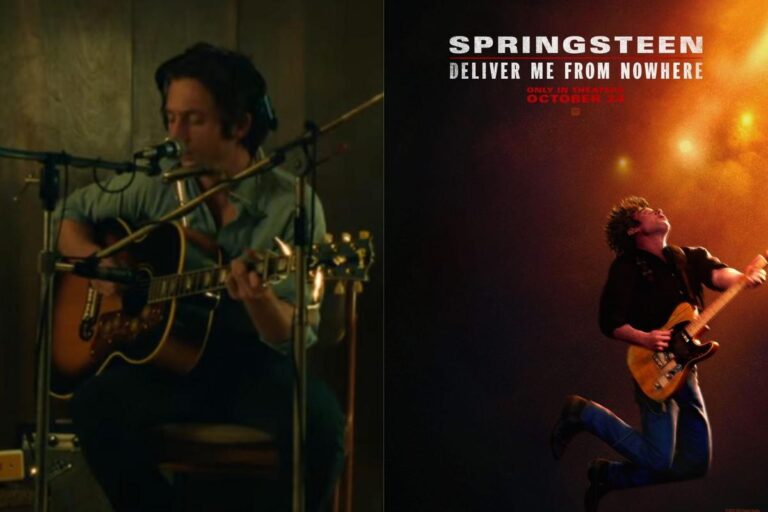When Alanis Morissette released Jagged Little Pill, the album made an immediate impression, thanks to a few very specific questions.
“You Oughta Know,” the lead single, found Morissette lashing out at a former love and mincing no words. It started out simply enough, with her wishing the new couple well, as you do. But things quickly took a turn. “An older version of me/ Is she perverted like me? / Would she go down on you in a theater? / Does she speak eloquently? / And would she have your baby? / I’m sure she’d make a really excellent mother.“
In the years since Jagged Little Pill was released, we still don’t know definitively the subject of the Canadian singer-songwriter’s ire in “You Oughta Know” (though it was rumored to be Full House star Dave Coulier) and honestly, it doesn’t matter. The subject matter was raw and identifiable, which is why the songs on Jagged Little Pill made a quick connection with a variety of listeners.
Watch Alanis Morissette’s ‘You Oughta Know’ Video
She was just twenty-one when the album came out, but as author Selena Fragassi details in her new book, Alanis: Thirty Years of Jagged Little Pill, there were songs waiting within the track listing to help guide you through the range of life experiences you were about to weather. “When we were eighteen and trying to stitch together a broken heart, there was track number two [“You Oughta Know”]. When we were in our twenties and trying to figure out this thing called life and how to handle all of the pressures of college and work and bills and adulting and still remain balanced, there was track number three [“Perfect“],” she writes. The cycle of evolution would continue, bringing in things like marriage and children — “Mary Jane” is your soundtrack for that time period, by the way. Though she was still quite young, Morissette wrote with wisdom that was far beyond the age on her driver’s license.
The truth is that she’d already been through a lot by the time Jagged Little Pill was released. Though many would think the record was her first, she’d actually released two albums in Canada on MCA Records. 1991’s Alanis and the subsequent follow-up, 1992’s Now is the Time featured more of a pop-themed direction. Prior to that, she’d even released an independent single in 1987, “Fate Stay With Me” and years later, admitted that it just seemed normal. “I thought that’s what every ten-year old did,” she told the New York Times. “I didn’t have very many people around me saying that I couldn’t do it.” She also did a stint on the popular Nickelodeon television series You Can’t Do That on Television. But behind the scenes of her burgeoning career, there were some soul-scarring events that unfortunately, left her with plenty to write about.
Listen to Alanis Morissette’s ‘Fate Stay With Me’
Still, the way she put that into words with Jagged Little Pill is impressive. “I don’t know where she had all this gumption and all this experience and all this ability to put it into words. The way she did that, to me, is fascinating,” Fragassi says in an interview for the UCR Podcast you can listen to below. “Having been through my 20s and knowing 20 year olds, that’s incredible. She was just so beyond her time. I think. I knew a bit about her past before, but really digging into her pop star past and what she dealt with as a kid star — and our understanding now of what has happened to kid stars, especially with those documentaries coming out [was a lot to process]. I think the way that she not only survived that, but she fueled it into [what] this album was and shared it with the rest of the world was just really incredible.”
“There’s a very strong case for the theme of perseverance in this album. I mean, she was dropped from MCA Records Canada after the second album, Now is the Time, didn’t really sell as much as her first album. She was changing the way she was writing music. If you listen to “Real World,” you can feel the Jagged songwriter in there,” Fragassi points out. Jagged Little Pill producer Glen Ballard also deserves important credit for helping the young songwriter navigate the path. “[He’s] the real unsung hero of this album,” she adds. “It very much is Alanis, but he was [also] the catalyst — and the angel and the devil on her shoulder, bringing these thoughts out of her.”
As Fragassi details in her book, Morissette’s manager, Scott Welch, was also careful about how his artist was being framed — and the bookings that she took on. “He talks about the fact that he did not want her to go on a singer-songwriter tour. He did not want her to play Lilith Fair either and he wanted her to have a rock band behind her to bring out that passion, and to keep her in the alt rock world,” she explains. “That’s why you had Taylor Hawkins on drums, Chris Chaney [of] Jane’s Addiction, is on bass, and then a few other really great instrumentalists as well. It was smart, the way that she was marketed and the package was put together too.”
How Alanis Influenced Today’s Musical Stars
Ultimately, the author can easily see the important doors that Alanis opened with the songwriting on Jagged Little Pill. “[Morissette] paved the way for so many modern confessional singer-songwriters,” she says. “Would we have a Taylor Swift? Would we have Olivia Rodrigo? Would they have been compelled to write the way they did if they hadn’t heard Jagged Little Pill? Alanis really kind of broke the glass ceiling. Lilith Fair happened for many reasons, but I think the promoters found out there could be success for it because she sold 33 million albums. Scott Welch said she was the first woman to make 300 million for a record label. So it was the idea that women were not only a voice. In the dollar [sign] eyes of other industry people, they were like, ‘Okay, we have something we can make money off,’ for better or worse, But it did give a platform for a lot more to come after that.”
READ MORE: Alanis Morissette Joins Taylor Swift to Perform ‘You Oughta Know’
Watch Alanis Morissette’s ‘You Learn’ Video
Jagged Little Pill is still a satisfying and inspiring listen to this day. History suggests that Morissette, who rightfully eventuallyAAla played God in Kevin Smith’s ’90s movie Dogma, will continue to have the last laugh. She remains a fierce live performer, but also someone who’s not afraid to use her voice for important causes. Maybe we should have known, but it seems Alanis always knew.
Important Women Who Broke Barriers in the Music Industry
Gallery Credit: Stacker



